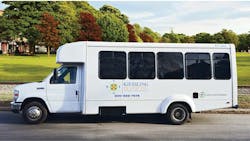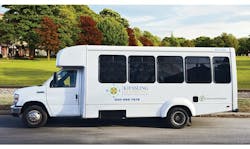More Hydraulic Hybrids on the Horizon
Lightning Hybrids, developer and manufacturer of hydraulic hybrid systems for medium- and heavy-duty trucks and buses, announced an agreement with Kiessling Transit to supply 35 hydraulic hybrid systems. The sale marks Lightning Hybrids’ largest order to date. Lightning Hybrids’ system has shown improvements of 30% in fuel efficiency and significantly reduced nitrogen-oxide (NOx) emissions during a year-long pilot program with Kiessling Transit Inc., Norfolk, Mass.
Kiessling’s fleet of new 2015 and 2016 Ford E450 chassis and Elkhart Coach bodies will incorporate the Lightning Hybrids parallel hybrid system installed prior to delivery this summer. The technology applies a hydraulic system to the driveline of a vehicle to regenerate braking energy. Hydraulic pumps and a lightweight accumulator store braking energy and use the stored energy to power the wheels. Application of this technology will result in improved emissions, less fuel use, longer brake life, better low-end torque, and lower maintenance and operational costs.
“This partnership with Kiessling Transit is a significant milestone for Lightning Hybrids, and a testament to the success and benefits of our system in providing a cost-effective and elegant solution for large fleets,” said Tim Reeser, president and co-founder of Lightning Hybrids. “Kiessling Transit is an innovative, early adopter and was one of the first customers to trial our technology for over a year. Their positive experience and attractive results during the pilot program lead to this substantial follow-on order. This program will demonstrate that it’s possible today to make existing fleet vehicles significantly cleaner and more efficient with a high-tech, computer-controlled system built on proven and sustainable hydraulic technology.”
Technology behind the benefits
The Lightning Hybrids system does not use any batteries. Instead, it safely and efficiently stores energy mechanically in composite hydraulic accumulators, which are a fraction of the cost and weight of batteries. The system can be installed on new vehicles or retrofitted on vehicles already in service.
Reeser explained, “Hydraulic hybrids, like all hybrid drivetrains, use regenerative braking, which saves energy from stopping the vehicle and uses it to move the vehicle forward. So a start-stop drive cycle is necessary to see gains from using a hybrid. For the Lighting Hybrids hydraulic system the ‘sweet spot’ in terms of efficiency is six to eight stops a mile, whether planned or due to traffic. This gives enough speed between each stop to save enough energy to accelerate the vehicle to the next stop.”
Launching the hybrid fleet
Kiessling Transit purchased a pilot vehicle equipped with the hybrid system through Lightning Hybrids’ Boston-based dealer, National Fleet Hybrids, in 2013. The pilot vehicle’s fuel consumption was closely monitored during the pilot program. The results, logged through Lightning Hybrids’ telematics systems and confirmed through Kiessling’s fuel logs, revealed a significant improvement in fuel economy and emissions. Driver feedback also confirmed vehicle performance benefits. Kiessling Transit will use the hybrid vehicles to transport primarily urban- area residents with disabilities.
Kiessling Transit Inc has been providing special needs transportation to the Massachusetts community since 1970. The company currently contracts with regional transit authorities, state agencies, and local municipalities to transport passengers throughout Massachusetts. Daily trips to and from residences, work sites, schools, medical appointments, and social events are provided for ambulatory and non-ambulatory customers with a wide range of disabilities.
When put in service, the buses will provide an immediate positive impact on the environment due to the reduced emissions of the system. For example, vehicles with Lightning Hybrids’ technology produce half of the NOx emissions and 30% less CO2 emissions than vehicles without the company’s system. In addition to these emissions reductions, the Kiessling fleet will benefit from decreased fuel use, longer brake life, better low-end torque, and lower maintenance and operational costs.
“We are pleased with the results of the pilot program, which proved a fuel economy gain of around 30% all year, and we look forward to seeing the positive results continue on a much larger scale,” said Roger Kiessling, chief operations officer, Kiessling Transit. “Our company is focused on providing the most efficient, reliable, environmentally friendly transportation to the areas we serve, and the Lightning Hybrids system supports this goal.”
For more information, visit Lightning Hybrids at www.lightninghybrids.com, or Kiessling Transport’s website at www.kiesslingtransit.com.


